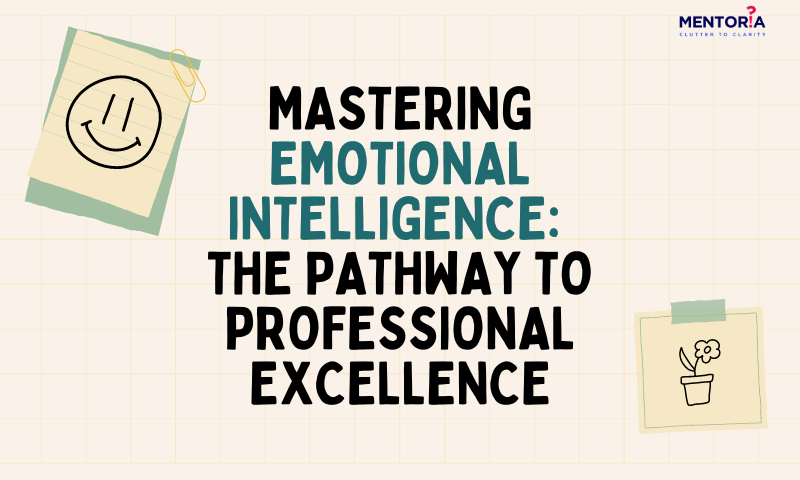Mastering Emotional Intelligence: The Pathway To Professional Excellence

Emotional intelligence, often overlooked in professional settings, holds the key to success and fulfilment in the modern workplace. It encompasses the ability to recognize, understand, and manage emotions, both within oneself and in others. With the rapid pace of change and increasing complexity of the professional landscape, individuals who possess high emotional intelligence gain a competitive edge. From fostering strong interpersonal relationships to making effective decisions under pressure, emotional intelligence empowers professionals to navigate challenges with grace and empathy. This blog delves into the profound importance of emotional intelligence in professional settings, exploring its benefits and providing valuable insights for cultivating this crucial skill.
What Is Emotional Intelligence?
Emotional intelligence refers to the ability to recognize, understand, and manage our own emotions, as well as effectively navigate and respond to the emotions of others. It encompasses self-awareness, self-regulation, empathy, and social skills. Imagine having a superpower that allows you to build meaningful relationships, resolve conflicts, and inspire teamwork—all while maintaining your own well-being. That superpower is emotional intelligence!
Emotional intelligence starts with self-awareness, which involves understanding our own emotions, strengths, weaknesses, and triggers. Self-regulation allows us to manage our emotions effectively, avoiding impulsive reactions and maintaining composure even in stressful situations. For instance, Harry Potter, the iconic wizard from J.K. Rowling’s series, embarks on a journey of self-awareness. As he navigates the wizarding world, Harry grapples with his own emotions, past traumas, and identity. Through introspection and guidance from mentors, he learns to understand his strengths, weaknesses, and the impact of his actions on himself and others. Empathy, the ability to understand and share the feelings of others, fosters stronger relationships and promotes a collaborative work environment. Social skills, including communication, teamwork, and leadership abilities, are essential for effective interactions with colleagues, clients, and stakeholders.
Why Emotional Intelligence?
- Enhanced Communication: Emotional intelligence helps us communicate clearly, listen actively, and understand the unspoken cues, fostering effective collaboration and minimising misunderstandings. This leads to improved teamwork and productivity.
- Strong Leadership: Leaders with high EI can inspire and motivate their team members, create a positive work environment, and lead by example. They are empathetic, approachable, and excel at resolving conflicts, resulting in higher employee satisfaction and retention.
- Conflict Resolution: EI empowers individuals to manage conflicts with tact and empathy, promoting win-win solutions and preserving relationships. By understanding the emotions and perspectives of all parties involved, conflicts can be resolved constructively, enhancing teamwork.
- Adaptability: In today’s rapidly changing work landscape, adaptability is key. EI enables individuals to embrace change, handle stress, and navigate challenges with resilience. Adaptable professionals are more likely to thrive and seize opportunities in dynamic environments.
- Decision Making: By considering both rationality and emotional aspects, EI helps us make well-informed decisions, taking into account the impact on individuals and teams. It helps balance logic with empathy, leading to decisions that consider the human factor.
How Emotional Intelligence Boosts Work And Life
- Self-Reflection: Organisations like Google encourage employees to engage in self-reflection through initiatives like the “Search Inside Yourself” program. By providing tools and resources for mindfulness and self-awareness practices, Google promotes emotional intelligence and personal growth among its workforce.
- Active Listening: LinkedIn is known for fostering a culture of active listening. Through initiatives like “InDay,” employees are encouraged to set aside time for listening and understanding their colleagues’ perspectives. This emphasis on active listening enhances collaboration and builds stronger relationships within the organisation.
- Emotional Regulation: The multinational technology company Intel recognizes the importance of emotional regulation in the workplace. Intel offers mindfulness programs and training sessions that equip employees with techniques to manage stress, regulate emotions, and enhance overall well-being.
- Empathy: The shoe company Zappos places a strong emphasis on empathy in its organisational culture. Zappos encourages employees to cultivate empathy by participating in community service activities and engaging in customer-centric practices. This emphasis on empathy has contributed to Zappos’ reputation for exceptional customer service.
- Social Skills: Southwest Airlines is known for its focus on social skills and building strong relationships with both employees and customers. Through comprehensive training programs, Southwest Airlines empowers its employees with the necessary social skills to provide excellent customer service and foster a positive work environment.
Success Stories: Emotional Intelligence In Action
Let’s explore real-life success stories where emotional intelligence played a transformative role. Steve Jobs, the visionary co-founder of Apple, exemplified the power of emotional intelligence in leadership. Known for his ability to inspire and motivate his team, Jobs fostered a culture of passion and dedication at Apple. Under his leadership, Apple revolutionised the technology industry with groundbreaking products such as the iPhone and iPad. Jobs’ deep understanding of consumers’ emotions allowed him to create products that resonated with their needs and desires. This emotional connection translated into remarkable business success. During Jobs’ tenure, Apple’s market capitalization grew from around $2 billion when he returned in 1997 to over $600 billion by the time of his passing in 2011. These astounding numbers reflect the impact of emotional intelligence in driving innovation and creating a positive work culture.
Indra Nooyi, the former CEO of PepsiCo, is another notable example of emotional intelligence in action. Nooyi’s empathetic leadership style focused on valuing diversity, fostering inclusivity, and promoting collaboration. Under her guidance, PepsiCo experienced significant growth and success. In 2017, the company’s revenue reached $63.5 billion. Nooyi’s commitment to sustainable practices and diversity and inclusion efforts earned PepsiCo recognition as one of the “World’s Most Admired Companies” by Fortune. By leveraging emotional intelligence, Nooyi empowered her team, nurtured a culture of innovation, and expanded PepsiCo’s presence in global markets
These visionary leaders used emotional intelligence to foster creativity, build strong teams, and navigate complex business challenges. Their stories exemplify how emotional intelligence can drive innovation, create a positive work culture, and deliver remarkable business outcomes.
How To Become Emotionally Intelligent
- Cultivate Self-Care: Prioritise self-care activities such as exercise, meditation, and hobbies to nurture your emotional well-being. When you take care of yourself, you’re better equipped to handle the demands of the workplace.
- Seek Feedback: Actively seek feedback from colleagues, mentors, and supervisors to gain insights into how your emotions impact your professional relationships. Embrace constructive criticism as an opportunity for growth.
- Practise Mindful Communication: Pay attention to your words, tone, and non-verbal cues when communicating with others. Practise active listening, clarity, and empathy to enhance your communication skills.
- Build Relationships: Invest time and effort into building genuine connections with colleagues. Foster a supportive and collaborative work environment by showing appreciation, offering help, and recognizing achievements.
- Lead by Example: Demonstrate emotional intelligence in your daily interactions. Be mindful of how your emotions influence others and strive to inspire positive emotions and behaviours in those around you.
Elevate Your Career With Confidence With Mentoria
As you embark on your professional journey, remember that emotional intelligence is the secret sauce that sets extraordinary individuals apart. It’s not just about the technical skills listed on your resume; it’s about how well you understand and connect with others, how effectively you manage your own emotions, and how you navigate the complex dynamics of the workplace. By cultivating emotional intelligence, you’ll become a respected leader, a trusted team member, and a source of inspiration. Remember, Mentoria is here to support you every step of the way. Our team of experienced career counsellors can provide personalised guidance and resources to help you develop and enhance your emotional intelligence. So, embrace the power of emotional intelligence and unlock your true potential!









